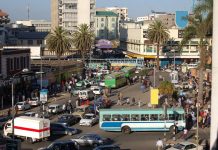Imports on used motor vehicles could drop sharply as the coronavirus spread continues to hit global supply chains.
This comes as overall trade through the Port of Mombasa continues to drop with imports dipping by at least 30 per cent in the last one month.
This has been occasioned by reduced orders from key markets of China and India, and stringent measures put in place by ports that have affected vessels turn-around.
According to the Shippers Council of Eastern Africa (SCEA), there has been a significant drop on vessels sailing the East Asia route, a key trading route, and dominant sub-region.
This has affected cargo uptake and transit patterns that have impacted volumes coming to Kenya.
“We have fewer ships sailing on this route. With this, the volumes coming to Mombasa have been dropping,” SCEA chief executive Gilbert Langat said yesterday.
Car dealers said though they are yet to evaluate the impact on importation of units, reduced mobility now posses a threat to volumes.
“We expect business to go down. In a week’s time, we will know the effects,” Kenya Auto Bazaar Association chairman John Kipchumba said.
Volumes are expected to go below 8,000 units a month from the current 12,000 units imported mainly from Japan, United Arab Emirates, United Kingdom, Singapore and South Africa.
Japan dominates the Kenyan second-hand car market with more than 80 per cent share and heavily relies on China on car fittings.
Supply chains in China have heavily been hit as a huge section of manufacturers remain closed over the virus.
“Japan cannot get inputs for motor vehicles from China which has affected even production,” Langat said.
Kenya Ports Authority(KPA) vessel data trend shows there are seven ships carrying motor vehicles expected to dock at Mombasa between tomorrow (March 18) and next Tuesday.
They are conventional vessels -Morning Celesta, Marguerite Ace, Onyx Ace, Mercury Ace, Hoegh Sydney, Jolly Perla and Kaijin.
Traditionally, the port receives up to 15 car-carrying vessels a week.
“Business has been down,” Car Importers Association of Kenya national chairman Peter Otieno told the Star yesterday, further blaming low sales on a drop in purchasing power in the local market.
Reduced activities by shipping lines threaten to increase freight costs, with the final impact being on commodity prices.
According to SCEA, the tough measures by ports are likely to increase shipping costs as vessels now take at least two more days before being cleared for docking.
It costs between $20,000 (Sh2.1 million ) and $45,000 (Sh 4.7 million ) per day for a ship voyage.
Meanwhile, the number of SGR trains moving cargo between the Port of Mombasa and the Inland Container Deport-Nairobi has reduced from an average of 8.6 trains a day to 6.2 trains, reflecting a drop on import volumes.
This translates to about 600 containers compared to up to 1,200 containers a day transported during peak times.
About 82 per cent of local manufacturers source raw materials from China, Kenya Association of Manufacturers data shows.
Most affected sectors in the wake of coronavirus remain textile, plastic and rubber and building and construction.
SOURCE: the-star.co.ke








![Top 20 Used Cars to Avoid Buying in Kenya – [PHOTOS]](../../../blog/wp-content/uploads/2013/11/top-used-unreliable-cars-to-avoid2-80x60.jpg)

![Top 20 Used Cars to Avoid Buying in Kenya – [PHOTOS]](../../../blog/wp-content/uploads/2013/11/top-used-unreliable-cars-to-avoid2-100x70.jpg)





